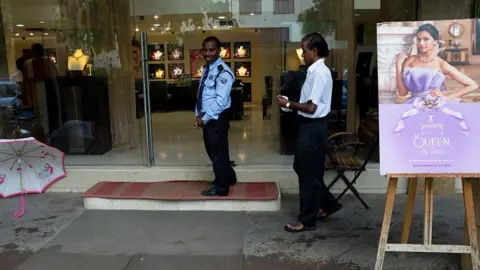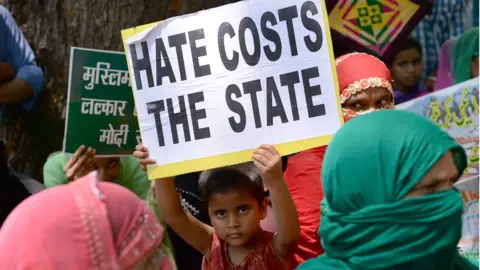Tanishq: Jewellery ad on interfaith couple withdrawn after outrage
 Tanishq
TanishqPopular Indian jewellery brand Tanishq has withdrawn an advertisement featuring an interfaith couple after a right-wing backlash on social media.
It shows a baby shower organised for the Hindu bride by her Muslim in-laws.
Opponents of the advert say it promotes "love jihad", a term radical Hindu groups use to accuse Muslim men of converting Hindu women by marriage.
Rights groups say religious tolerance is under threat in India. Hindu-Muslim marriages have long attracted censure.
However, the attachment of a deeper, sinister motive to them - of "love jihad" - is a recent phenomenon.
A section of conservative social media users led calls to boycott the brand, taking it to the top of Twitter trends. Many joined in to condemn the abusive posts and comments which bolstered the boycott trend.
 Getty Images
Getty ImagesThe description for the advertisement posted to YouTube read: "She is married into a family that loves her like their own child. Only for her, they go out of their way to celebrate an occasion that they usually don't. A beautiful confluence of two different religions, traditions and cultures."
The 43-second ad - promoting a jewellery line called "Ekatvam" (Hindi word for unity) - has been taken down from Tanishq's social media channels. The company issued a statement later on Tuesday saying the campaign was meant to celebrate diversity, but withdrew the advert due to the "divergent and severe reactions" it has prompted, which it said was "contrary to its objective". The company added that the decision was made keeping in mind the "well being" of their employees and partners.
The brand first disabled comments and Likes/Dislikes on the advert, posted to Facebook and YouTube. It later removed the video.
Opposition Congress party MP Shashi Tharoor, who posted the advert to his Twitter account, said that "Hindutva bigots have called for a boycott for highlighting Hindu-Muslim unity through this beautiful ad".
"If Hindu-Muslim 'ekatvam' irks them so much, why don't they boycott the longest surviving symbol of Hindu-Muslim unity - India?" Mr Tharoor wrote.
Allow X content?

Most Indian families still prefer weddings arranged within their religion and caste; and marriages outside these boundaries have sometimes led to violent consequences, including women - sometimes men - being killed by their relatives.
According to the India Human Development Survey, only about 5% of all marriages are inter-caste and interfaith couples are even rarer.
A 2016 survey, Social Attitudes Research for India (Sari), conducted across Delhi, Mumbai, and the states of Uttar Pradesh and Rajasthan found the majority of respondents opposed to inter-caste and inter-religious marriages.
In fact they were in favour of a law banning such marriages.
Gender activists say the onus of upholding tradition, culture and "purity" falls on the woman and if she marries outside traditional boundaries, she is seen as besmirching the honour of her family and the community.
This is set against the backdrop of an India where religious polarisation is increasing. A Hindu nationalist government has been in power since 2014 and is accused by its critics of normalising anti-Muslim sentiment.
 Getty Images
Getty ImagesIn 2018, a Facebook page calling for violence against 102 Muslim men who are allegedly in relationships with Hindu women was taken down.
The page, which asked Hindus to "track and hunt the boys on the list", prompted outrage online.
